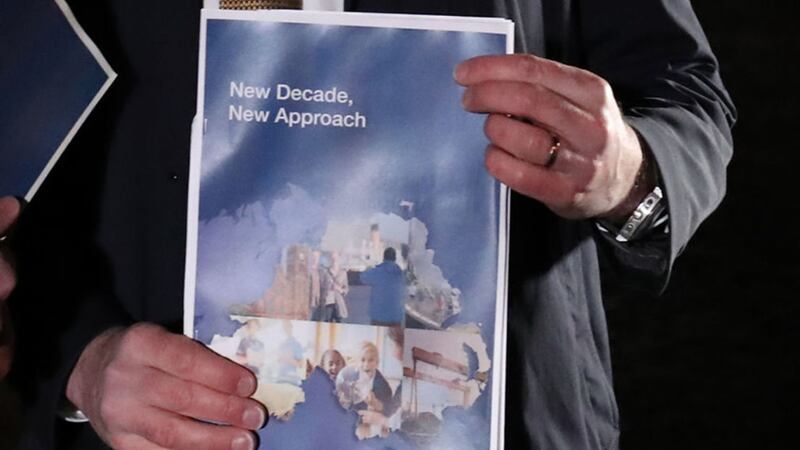How can the executive parties have failed to pin down any funding before agreeing to New Decade, New Approach?
Stormont deals are usually published with financial annexes, itemising UK and Irish government support. Incredibly, London’s annex in the latest deal did not contain any figures, despite including a long list of “conditions” for Stormont to meet. Dublin’s annex only mentioned two figures, both pre-existing commitments, one of them by the British government.
It took another three days of haggling to extract figures from London, producing less than half the money Stormont expected. Was everyone too busy laughing at the DUP for being thrown under a bus to notice Boris Johnson was doing the same to them all?
The desperation of Sinn Féin and the DUP to get back into office, combined with the distraction of culture war squabbling, may explain this lack of focus but cannot excuse it. The 2015 Fresh Start negotiations were more fraught, yet that deal contained detailed financial pledges. More tellingly, the 2014 Stormont House agreement collapsed at the last minute due to culture-war squabbling, yet even it contained a proper financial annex.
**
New Decade, New Approach contains a promise to implement the Stormont House agreement legacy process. This promise caused some rumblings from the Conservative and Labour backbenches. Johnson then caused rumblings in Northern Ireland by assuring MPs that “nothing in the agreement will stop us going ahead with legislation to ensure that no one who has served in our armed forces suffers vexatious or unfair prosecutions for cases that happened many years ago when no new evidence has come to light.”
This quote is worth noting in full to realise how it all cancels out. If ‘vexatious and unfair’ are defined as prosecutions without new evidence, then there are no vexatious or unfair prosecutions, nor will there ever be.
**
Secretary of state Julian Smith’s accomplishment in landing the deal is all the more impressive now its initial lack of clarity has been revealed.
Smith was a Remainer in the EU referendum. After December’s general election he was widely reported as for the chop in Boris Johnson’s first cabinet reshuffle, scheduled for next month. That should have made him a lame duck before Stormont talks even began. A strained relationship with the prime minister cannot have helped in obtaining firm cash commitments from London.
The Spectator, which should know, now reports Smith has probably saved his job by saving Stormont. But with the mercurial Johnson there are no guarantees. Northern Ireland is set to return to being a Brexit issue, so the prime minister may want a Brexit true believer in Belfast.
**
SDLP MLA Patsy McGlone was deputy speaker when Stormont collapsed and there was a general understanding he would be Speaker if it ever returned, so the SDLP was outraged when Sinn Féin and the DUP ganged up to choose Sinn Féin’s Alex Maskey instead.
UUP peer Lord Kilclooney was only half-joking when he suggested this is because McGlone is a fluent Irish speaker. Sinn Féin and the DUP would both find that uncomfortable, for different reasons.
Maskey still promises to be excellent entertainment. He has already told off the SDLP’s Colin McGrath for “insulting” him - the Ulster-Scots term ‘slabbering’ was clearly implied. Maskey once threatened to set his solicitor on another member in the assembly chamber. Might he do that as Speaker?
**
It would have been ironic if Flybe, Northern Ireland’s air-bridge to Britain, had collapsed on the day of Boris Johnson’s visit. There was brief talk of saving the airline by abolishing domestic air passenger duty, a long-standing Stormont objective. The government conjured up a rescue deal after balancing EU state aid rules and its environment policy against its regional development priorities.
Stormont was not involved in this but it has a remit over the issues raised. The Northern Ireland executive is responsible for “collaborative planning of key infrastructure” at the Good Friday Agreement’s British-Irish Council.
Given Flybe’s importance to the devolved regions, Isle of Man and Channel Islands, the council is an ideal forum to discuss regional air transport - or rather it would be, if the British government had ever taken it seriously.
**
Fianna Fáil and Irish Labour have ruled out coalition with Sinn Féin because former Stormont finance minister Máirtín Ó Muilleoir told the RHI inquiry he consulted with ‘senior republicans’. Both parties say this means Sinn Féin is controlled by the IRA. Sinn Féin says Ó Muilleoir merely consulted with “special advisers”.
The dichotomous nature of Sinn Féin should be baked into the political system by now, north and south. The real bombshell in Ó Muilleoir’s testimony, which Fianna Fáil and Labour seems to have missed, came when he blithely explained Sinn Féin ignores 2013 legislation on who can be a special adviser because the party does not agree with it.
How can you govern with people who think laws are optional?









